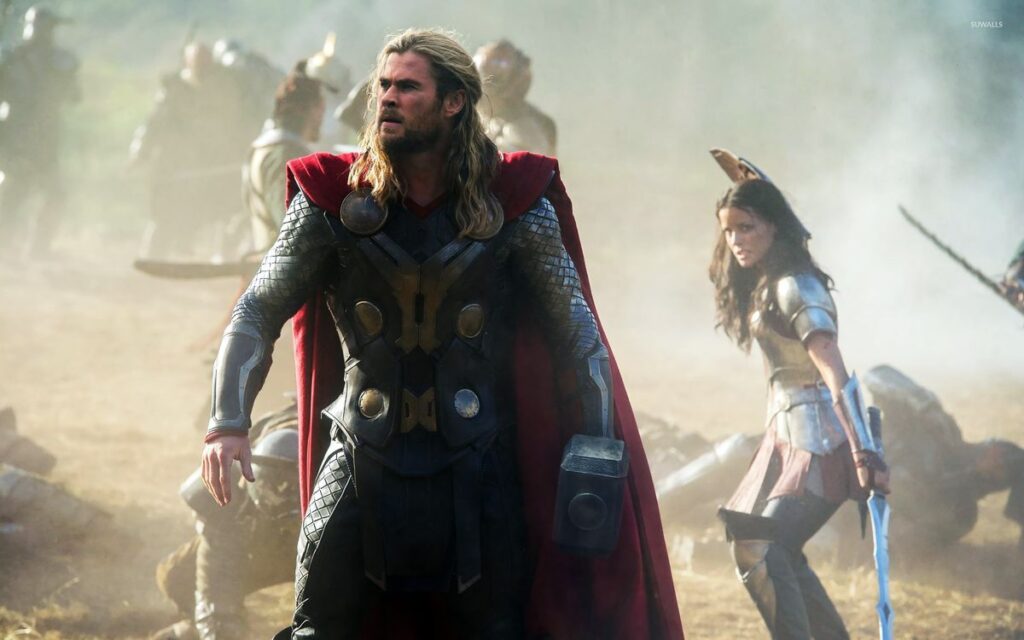In Thor: Love and Thunder, the heroes go up against a new villain: the vengeance-minded supernatural assassin Gorr the God Butcher (Christian Bale). As his name implies, Gorr’s whole schtick is killing gods, a mission he took on for himself after the god he worshiped wouldn’t lift a finger to help him in his time of need. With his dark, shadowy Necrosword, Gorr is on a quest to kill every god ever, because as far as he (or we) can tell, they’ve done nothing to help their followers, or even to marginally make the multiverse a better place.
Since Thor (Chris Hemsworth) is a god himself, he disapproves of Gorr’s murder spree, especially when he and other survivors of the destruction of his home, Asgard, become Gorr’s next targets. Thor mourns some of the gods Gorr has killed, and seeks help from some who haven’t been targeted yet. The wide range of beings he encounters in the process brings up a question that haunts the MCU, especially as these mythological deities become more and more central to the movies: What the hell makes a god in the MCU?
[Ed. note: Some broad story spoilers ahead for Thor: Love and Thunder.]
The Asgardian Dilemma
Image: Marvel Studios
Doesn’t Thor: Love and Thunder answer this question? you might ask. Gods are just the immortal entities that mortal species worship across the universe, right? Ah, if only it were that simple. Here’s one complication: When the Asgardians were first introduced in 2011’s Thor, they were presented as aliens.
Back in the early days of the MCU, the movies stayed away from mystical and magical elements. All the powers and action centered on technology, science, and interplanetary aliens, which were supposed to feel more serious and cool and grown-up than wibbly-wobbly fantasy. The “magic” of Asgard used to be just very advanced science, something Jane Foster noted when she visited Asgard in 2013’s Thor: The Dark World. This extended to the rest of the MCU, with Wanda Maximoff’s powers initially explained in 2015’s Avengers: Age of Ultron as the result of scientific experimentation rather than magic. Nobody identified her as a “witch” until WandaVision established a tradition and history of witches.
So once upon a time, all the magic in the MCU was really just science… until it wasn’t. You can’t have Stephen Strange, the Sorcerer Supreme, without some magic. At this point, the MCU has fully embraced magic as a power source and type, which means the gods can be gods again, not just people from a different world. But at the same time, they’re also still kinda aliens, since so much of what they do involves going into space.
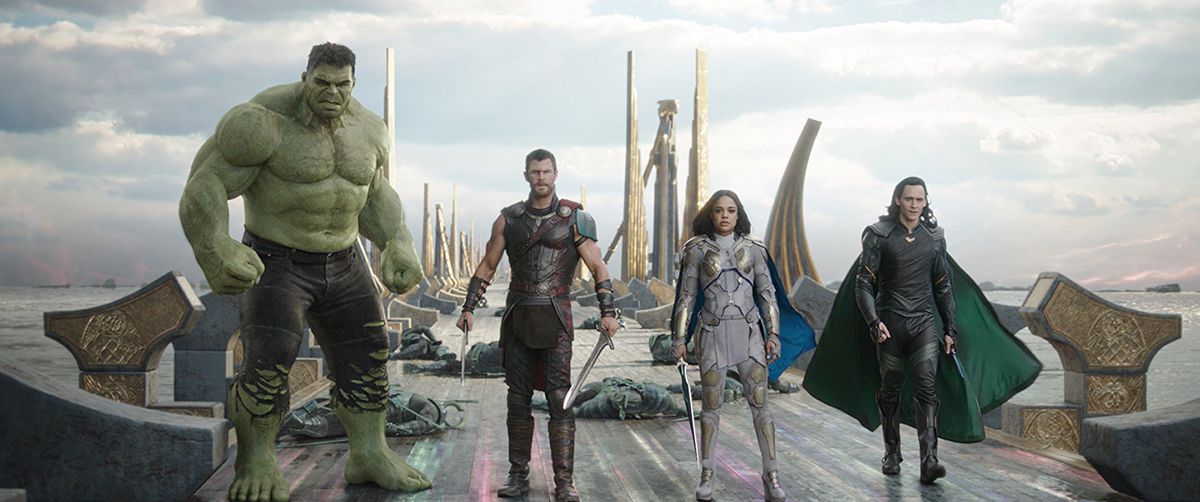
Image: Marvel Studios/Disney
In Thor: Love and Thunder, Thor and his pals seek help in Omnipotence City, where gods hang out in what looks like a space station, ruled by Zeus (played by Russell Crowe). When Thor and his friends arrive, they walk through a host of other gods — some referencing or inspired by real-world cultures, and others from MCU fiction. Amid some of those real-world deities, like the beings in traditional Aztec attire, there’s also the rock god that Taika Waititi’s rock alien Korg worships (he sits proudly on a throne of vanquished scissors) and Bao, the god of dumplings. (He isn’t an actual Chinese mythological figure, but he’s adorable nonetheless.) A couple of the Eternals’ Celestial masters appear as well. Other established MCU gods are notably absent, though, like the Egyptian deities seen in Moon Knight.
Traveling to Omnipotence City clearly involves traveling somewhere in space. Classic superhero comics often blur the lines between magic and science — not surprising in a genre that’s only slightly younger than broadcast radio, and a couple of decades older than the space race. The MCU reflects this loosey-goosey cosmology — what exactly is the difference between Doctor Strange’s sorcery and Scarlet Witch’s witchcraft? We never find out, apart from being told that witchcraft is bad for some reason. If Wanda’s powers have been always inside of her, and were just activated by Baron Strucker’s HYDRA experiments, what does that make the Infinity Stones, or the Necrosword itself? How do beings from other universes figure into the cosmology? The questions keep expanding along with the MCU, but that’s probably a subject for another article.
The verdict: All gods are just aliens, and human minds are too feeble to understand the difference.
The Eternal Question
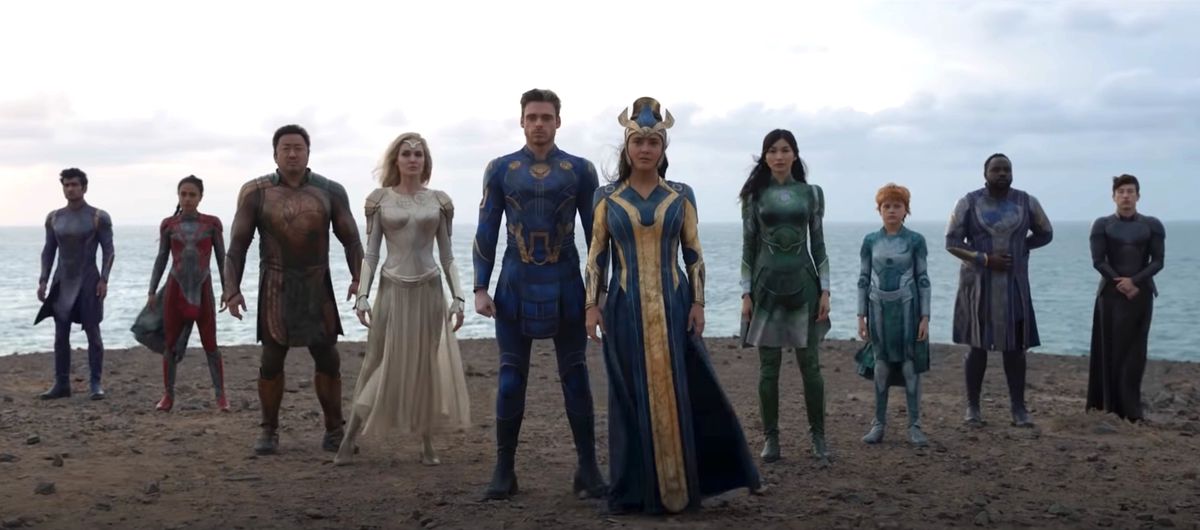
Image: Marvel Studios
So far so good — except that in 2021’s Eternals, we learn that a lot of Earth religions came from myths and legends influenced by the presence of near-immortal beings called the Eternals, who guided humanity for thousands of years.
Most of the Eternals aren’t directly seen as gods, but they did inspire the stories of heroic mythological figures: Sersi is the sorceress Circe; Ikaris is Icarus, the dude who flew too close to the sun; Ajak is the Greek warrior Ajax of The Iliad; and Gilgamesh is the protagonist from the Epic of Gilgamesh. Other members of the group prompted legends about general mythological concepts, like druids and sprites. But Phastos, Thena, and Makkari have direct Greco-Roman counterparts in Hephaestus, Athena, and Mercury. It’s a big part of Eternals that their guidance of humanity inspired stories across cultures, and the closing credits, which juxtapose some of the actors’ names with artistic representations of their characters’ mythological counterparts, hammers this connection home.
That would actually support the “All gods are actually aliens, and humans are just too dumb to know the difference” idea, if Zeus wasn’t introduced in Omnipotence City as “a god,” in the traditional human sense. Beyond a passing nod to Dionysus, the god of wine, there are no other direct mentions of Greek mythological figures in the city. But Zeus sparks obvious questions: Were some of Earth’s Greek deities god-gods, instead of just Eternals or passed-down legends of Eternals? Is there an actual Athena kicking around in Omnipotence City, while Thena the Eternal did all her dirty work on Earth? Could belief in a god-figure help create or empower an actual god, the way it does in (for instance) Neil Gaiman’s novels?
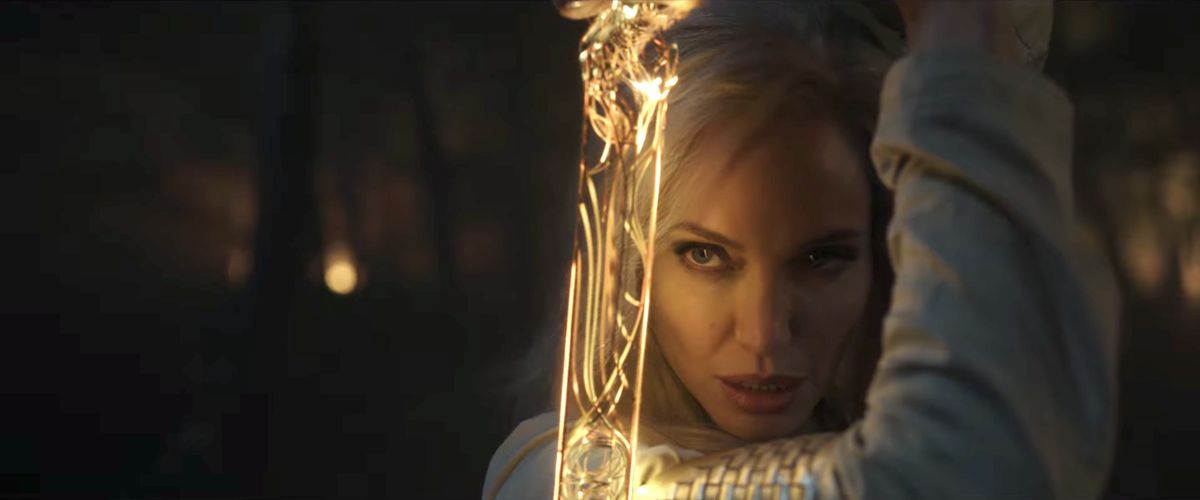
Image: Marvel Studios
And what about the Roman counterparts? Is Zeus actually Jupiter, since Roman mythology is basically a copy-paste of Greek mythology with some parts added and removed for pizzaz? Or is there a different Jupiter who fills in for Zeus when he’s too hungover to throw lightning bolts around? Actor Carmen Foon is credited as Minerva (Athena’s Roman counterpart) in Thor: Love and Thunder, who is very much not played by Angelina Jolie, who plays Thena — so does that mean there are separate Greek and Roman deities?
Then there’s the question of the Celestials, the primordial race responsible for creating the Eternals. They are the oldest beings in the universe, and in fact created it — which would make them the closest thing to the Abrahamic God in the MCU so far. But aside from the Guardians of the Galaxy running into Ego (not a Celestial in the comics, but adapted into sort of one for the MCU), no one but the Eternals seems super aware of the Celestials. No MCU property since Eternals has acknowledged Tiamut, the giant celestial that started to hatch from the Earth’s crust. Even though Sersi turned it into marble, it’s still there, which you’d think Earth’s heroes might notice.
The new verdict: Some gods are beings sent by a primordial race of godlike aliens, and some gods are actually aliens. But clearly some gods are the actual mythological gods we know.
What the hell is up with Moon Knight?
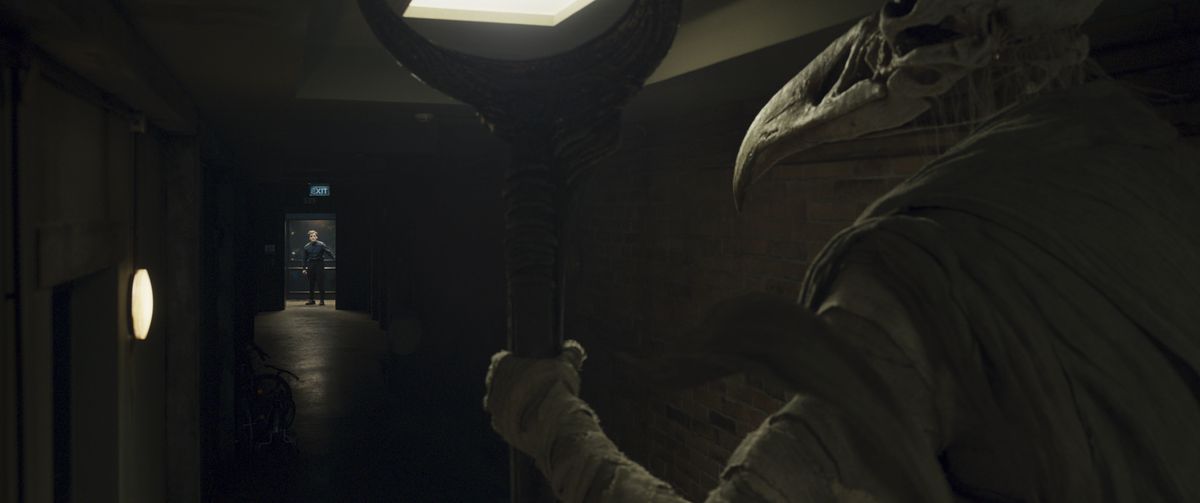
Image: Marvel Studios
And then there’s Moon Knight.
Moon Knight draws heavily from Egyptian mythology and establishes that the Egyptian gods exist but don’t directly interact with humanity anymore. Instead, they empower humans as avatars to carry out their bidding. Much of Moon Knight is far removed from the MCU — beyond a brief Black Panther reference when Moon Knight’s human personalities, Steven and Marc, wander into the Land of the Dead and meet the hippo goddess Taweret, there actually isn’t much to tie it to the rest of the MCU.
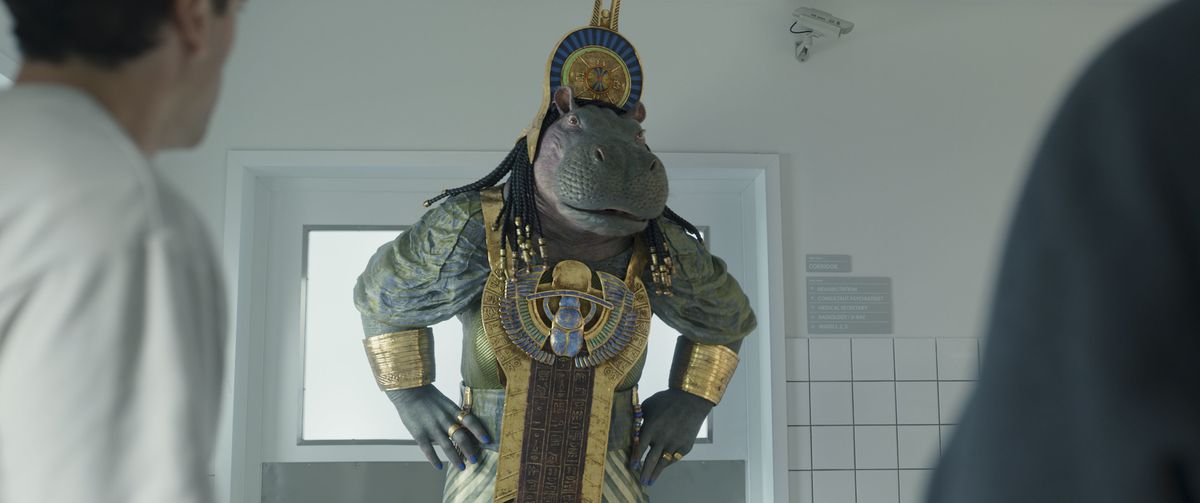
Image: Marvel Studios
But it is still part of this complicated web of gods. Moon Knight writer Jeremy Slater revealed that the show’s team had to cut some script references to Gorr the God Butcher because they simply did not know whether Moon Knight would be released before Love and Thunder.
So are the Moon Knight gods the same type of gods as the ones we see in Omnipotence City — immortal, powerful beings that aren’t just high-tech aliens or servants of an even higher power? Probably, except that they very notably aren’t in Omnipotence City, in spite of their distance from humanity on Earth.
The new-new verdict: There are actual gods, but they’re really removed from the day-to-day machinations of life, so they use people as avatars to do their bidding, and also don’t even hang out with their fellow gods, likely because Zeus is an exclusionist asshole.
Putting it all together
Norse gods are Asgardians who are aliens, but not really. The Greek Pantheon is made up of some empowered beings, but also some gods, and we’re not sure whether Greek gods and Roman gods are the same. Egyptian gods are actual gods, but they don’t really do the god thing anymore, and instead just use humans to do their bidding. The gods of major real-world religions that are still being practiced don’t come up in these stories, but gods of religions practiced by aliens certainly do. The MCU now has magic, except when it doesn’t. Maybe Thor: Love and Thunder director Taika Waititi puts it best.
“There’s a certain line where you gotta leave the other stuff behind,” he tells Polygon. “Otherwise, you get bogged down in this idea of honoring the truth or the authenticity of something. Any comic book character is reinterpreted a different way by different writers and different artists each time there’s a new run. That also proves that nothing is actually sacred.”
The final verdict: Everything is made up and nothing matters, so let’s just have some fun and use gods as little paper dolls for our cinematic universe playtime.
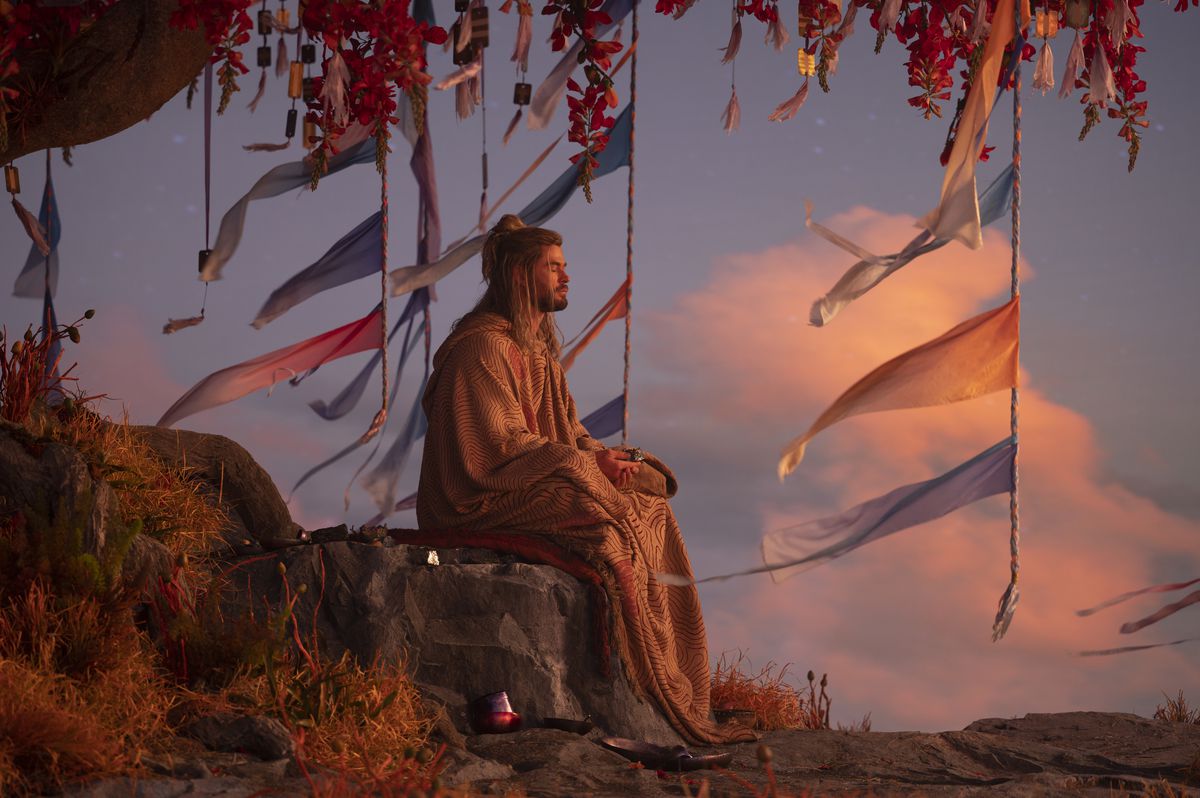
Thor: Love and Thunder is out in theaters now.

